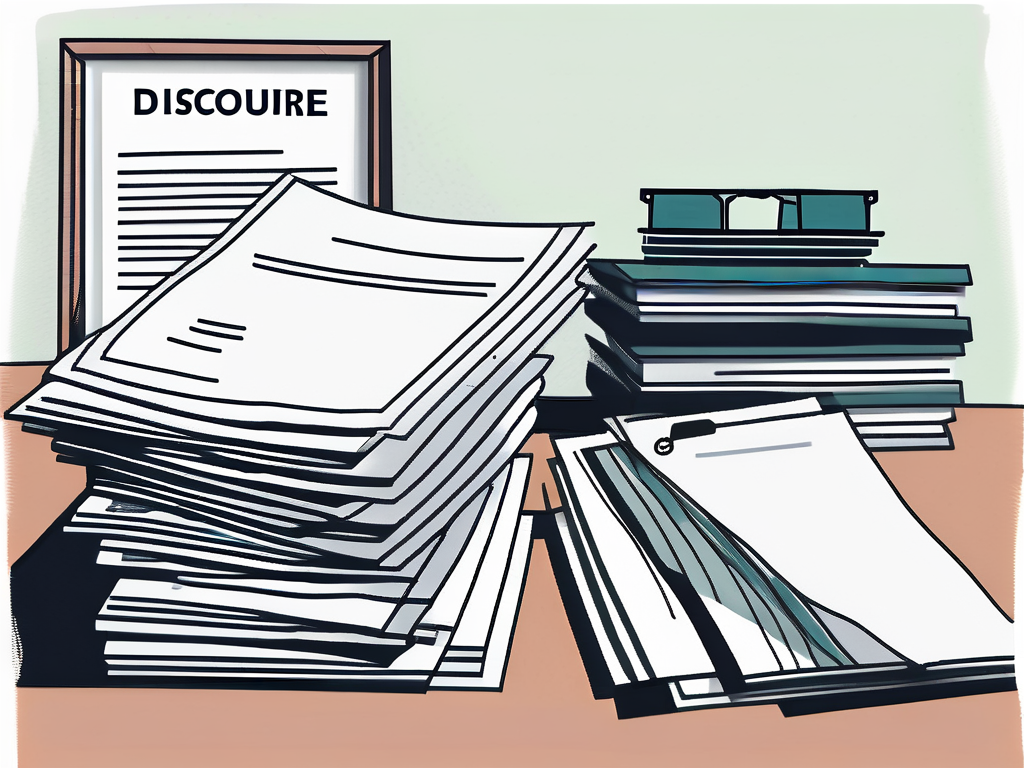Legal Forms Required for Selling a Home


Selling a home is a complex process that involves various legal aspects. Among the many important aspects of home selling is the proper completion and submission of legal forms. These forms play a crucial role in ensuring a smooth and legally binding transaction. In this article, we will outline the importance of legal forms in home selling, explore some of the essential forms that sellers need to be familiar with, understand the consequences of incomplete or incorrect forms, and discuss when it is necessary to seek legal assistance in the home selling process.
Understanding the Importance of Legal Forms in Home Selling
When selling a home, legal forms act as the foundation for the entire transaction. They provide crucial information and protect the interests of both the seller and the buyer. By properly completing and submitting these forms, sellers can ensure transparency and compliance with relevant laws and regulations. Legal forms serve as evidence of the terms and conditions agreed upon by both parties, making it essential to understand their significance.

The Role of Legal Forms in Real Estate Transactions
Legal forms act as binding contracts in real estate transactions. They outline the terms of the sale, including the purchase price, financing arrangements, and any other conditions specific to the sale. These forms also serve as a vehicle for disclosure, ensuring that sellers provide accurate information about the property to potential buyers. Overall, legal forms help establish trust between the parties involved and provide a clear framework for the sale.
Why Accurate Legal Documentation is Crucial
Accurate legal documentation is crucial for both sellers and buyers. It helps protect sellers from potential legal disputes that may arise after the sale. By providing accurate information about the property, sellers can avoid accusations of misrepresentation or fraud. On the other hand, buyers rely on these documents to make informed decisions about the purchase. By ensuring the accuracy of their legal documentation, sellers can maintain their reputation and avoid unnecessary legal and financial complications.
Furthermore, accurate legal documentation plays a vital role in securing financing for the buyer. Lenders require detailed information about the property and the terms of the sale before approving a mortgage. Without accurate legal forms, the buyer may face difficulties in obtaining the necessary funds to complete the purchase. Therefore, sellers must ensure that all the necessary legal documents are completed accurately and submitted in a timely manner to facilitate a smooth and successful transaction.
In addition to protecting the interests of the parties involved, legal forms also serve as a historical record of the transaction. They provide a documented trail of the sale, which can be useful for future reference or in the event of any disputes that may arise. Having a comprehensive set of legal forms ensures that all aspects of the sale are properly documented, leaving no room for ambiguity or misunderstanding.
Overview of Essential Legal Forms for Home Sellers
Now that we understand the importance of legal forms in home selling, let's explore some of the essential forms that every seller should be familiar with:
Property Disclosure Form
A property disclosure form is a vital document that sellers must complete. This form requires sellers to disclose any known material defects or issues with the property. It includes information about the property's structural integrity, potential water damage, pest infestation, electrical or plumbing issues, and any past renovations or repairs. Failure to disclose these defects can result in legal consequences and potential financial liability for the seller.
Additionally, the property disclosure form may also cover details about the property's environmental status, such as the presence of hazardous materials like lead-based paint or asbestos. Sellers are obligated to provide accurate information to buyers to ensure transparency and protect both parties from future disputes. It is crucial for sellers to thoroughly review and truthfully complete this form to avoid legal complications down the line.
Purchase Agreement Form
A purchase agreement form is the contract that outlines the terms and conditions of the sale. It includes details such as the purchase price, earnest money deposit, financing arrangements, closing date, and any contingencies. This document serves as the basis for the legal transaction and is essential to protect the interests of both the seller and the buyer.
Moreover, the purchase agreement form may also encompass provisions related to property inspections, title searches, and potential liabilities. By signing this agreement, both parties agree to adhere to the specified terms and conditions, ensuring a smooth and legally binding property transfer process. It is advisable for sellers to seek legal counsel to review the purchase agreement thoroughly and address any concerns before signing.
Counteroffer Form
A counteroffer form is used when a seller receives an offer from a buyer but wishes to make changes to the terms proposed. This form allows sellers to negotiate and make counteroffers regarding the purchase price, closing date, or other conditions. It ensures that the negotiation process is documented and legally binding.
Furthermore, the counteroffer form enables sellers to clearly outline their desired modifications to the original offer, providing a structured framework for effective communication between the parties involved. By utilizing this form, sellers can navigate the negotiation process with clarity and professionalism, ultimately reaching a mutually agreeable agreement. It is essential for sellers to keep records of all counteroffers and responses to maintain a transparent and organized negotiation process.
Navigating the Legal Aspects of Home Selling
In addition to understanding the essential legal forms, sellers must also be aware of their legal responsibilities and be knowledgeable about real estate laws and regulations.

When delving into the legal aspects of home selling, sellers often find themselves immersed in a complex web of regulations and requirements. Beyond just signing paperwork, sellers must navigate a landscape rife with potential pitfalls and legal nuances. It is crucial for sellers to not only understand the basics but also delve deeper into the intricacies of real estate law to ensure a smooth and legally sound transaction.
Legal Responsibilities of the Seller
As a seller, it is crucial to understand your legal responsibilities during the home selling process. These responsibilities may include providing accurate information about the property, making necessary disclosures, cooperating with inspections, and ensuring compliance with local and state regulations. By being informed and fulfilling these responsibilities, sellers can minimize the risk of legal disputes.
One key aspect of a seller's legal responsibilities is the duty to disclose any known issues or defects with the property. Failure to disclose such information can lead to legal repercussions and potential lawsuits down the line. Sellers must tread carefully and ensure full transparency to protect themselves from future liabilities.
Understanding Real Estate Laws and Regulations
Real estate laws and regulations vary by jurisdiction. It is essential for sellers to familiarize themselves with the specific laws governing home sales in their area. This includes understanding the requirements for disclosures, contract formation, and any additional obligations imposed on sellers. Staying up-to-date with these laws can help sellers navigate the legal aspects of home selling effectively.
Furthermore, sellers should be aware of the ever-evolving nature of real estate laws. As laws and regulations frequently change and new precedents are set, staying informed is paramount. Seeking legal counsel or guidance from real estate professionals can provide sellers with the necessary knowledge to adapt to any legal changes that may impact their home selling process.
The Consequences of Incomplete or Incorrect Legal Forms
Failure to properly complete or submit the required legal forms can have significant consequences for sellers. It can lead to potential legal disputes and financial implications.

Ensuring the accuracy and completeness of legal forms is crucial in real estate transactions. In addition to the buyer-seller relationship, incomplete or incorrect forms can also impact other parties involved, such as real estate agents, brokers, and even lending institutions. Any discrepancies or omissions in the documentation can delay the closing process and create a ripple effect of complications.
Potential Legal Disputes
Incomplete or incorrect legal forms can give rise to legal disputes between the seller and the buyer. For example, if the property disclosure form omits crucial information about defects in the property, the buyer may discover these issues after the sale and hold the seller liable for misrepresentation. Such disputes can result in costly litigation and damage the reputation of the seller.
Moreover, legal disputes can also arise from errors in contract terms or conditions. If there are discrepancies in the agreed-upon terms due to incomplete forms, it can lead to confusion and disagreements between the parties involved. This can further escalate into legal action, causing stress and financial strain for all parties.
Financial Implications
Incomplete or incorrect forms can also have financial implications. For instance, if a seller fails to disclose a known defect in the property, the buyer may incur expenses for repairs or remediation after the sale. The buyer may then seek compensation from the seller for the cost of these repairs. Additionally, sellers may face financial penalties for non-compliance with legal requirements.
Furthermore, incomplete forms can impact the financial aspects of the transaction, such as loan approvals and insurance coverage. Lenders rely on accurate information provided in legal forms to assess the risk associated with the property. Any inaccuracies can lead to delays in loan processing or even rejection of the loan application, affecting the financial well-being of all parties involved.
Seeking Legal Assistance in Home Selling
Given the potential legal complexities involved in home selling, sellers may benefit from seeking legal assistance at various stages of the process.
When selling a home, it is crucial to understand the legal implications and obligations that come with the transaction. From disclosure requirements to contract negotiations, legal issues can arise that may require the expertise of a professional. Seeking legal assistance can provide sellers with the peace of mind that their interests are protected and that they are complying with all relevant laws and regulations.
When to Consult a Real Estate Attorney
Sellers should consider consulting a real estate attorney when they have concerns about legal obligations or when complex legal issues arise. An attorney can provide guidance, review the legal forms, ensure compliance with applicable laws, and address any legal concerns that may arise during the home selling process. The expertise of an attorney can help sellers navigate potential legal pitfalls and safeguard their interests.
Real estate transactions involve a myriad of legal documents and contracts that can be overwhelming for sellers to navigate on their own. A real estate attorney can offer clarity on the terms and conditions outlined in these documents, ensuring that sellers fully understand the implications of each clause before signing. Additionally, an attorney can conduct thorough due diligence to uncover any potential legal issues that may impact the sale of the property, allowing sellers to address these issues proactively.
The Role of a Real Estate Agent in Legal Documentation
A real estate agent can also play a significant role in ensuring the proper completion and submission of legal forms. They can guide sellers through the paperwork, provide information on legal requirements, and help sellers understand their legal responsibilities. While an agent is not a substitute for legal advice, their expertise can be valuable in facilitating a smooth transaction.
Real estate agents are well-versed in the local market trends and regulations, making them valuable resources for sellers looking to navigate the complexities of the home selling process. Their knowledge of the legal documentation required for a successful sale can streamline the transaction and help sellers avoid common pitfalls. By working in conjunction with a real estate attorney, sellers can benefit from a comprehensive legal support system that ensures a seamless and legally sound home selling experience.
Final Thoughts on Legal Forms in Home Selling
In conclusion, legal forms are an integral part of the home selling process. They provide structure, protect the interests of sellers and buyers, ensure compliance with laws and regulations, and minimize the risk of legal disputes. Sellers must take the time to understand and properly complete these forms to ensure a smooth and legally binding transaction. By prioritizing legal preparedness and seeking appropriate legal assistance when needed, sellers can navigate the complexities of home selling with confidence and peace of mind.
It is important to note that legal forms in home selling can vary depending on the state or country in which the transaction takes place. Different regions may have specific requirements or clauses that must be included in the forms to make them legally valid. Sellers should therefore familiarize themselves with the local laws and regulations governing real estate transactions to ensure full compliance and avoid any potential legal pitfalls.
Furthermore, beyond just filling out the necessary legal forms, sellers should also consider additional documentation that can enhance the transparency and clarity of the transaction. This may include property disclosure statements, inspection reports, and any relevant warranties or guarantees. Providing comprehensive documentation not only builds trust with potential buyers but also protects sellers from future legal challenges or disputes.
Ready to Sell Your Home with Confidence?
Embark on your home selling journey with SmartSellersMatch.com, where we equip you with the knowledge and tools to sell your home successfully. Our comprehensive FSBO course, available for free, is designed to guide you through the complexities of selling a home online. You'll gain access to a curated library of essential legal documents and benefit from our innovative FSBO Assistant—a chatbot that helps with listing descriptions, home price estimates, cost breakdowns, and personalized advice for your area. Don't navigate the home selling process alone; take the free FSBO Course today and match with success!





